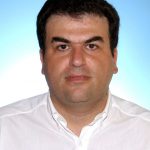| Subject Area | Energy |
|---|---|
| Semester | Semester 8 – Spring |
| Type | Elective |
| Teaching Method | Tutoring |
| Teaching Hours | 4 |
| ECTS | 6 |
| Prerequisites | |
| Course Site | https://eclass.uth.gr/ |
| Course Director |
|
| Course Instructor |
|
The course serves as an introduction to wave theory, electroacoustic transducers and the design of electroacoustic devices. Analytically:
- Basic acoustic concepts: Production of sound waves. One-dimensional wave equation. Sound pressure level. Intensity level. Total sound pressure level of a number of uncorrelated sources.
Subjective perception of sound: Anatomy of the hearing mechanism. Loudness. Subjective volume. Masking phenomenon. The Haas phenomenon. - Equivalent acousto-mechanical circuits: Mechanical resistance, mass, stiffness. Acoustic resistance, mass, stifnesss. Acoustic transformers.
- Microphones: Dynamic microphone. Capacitor microphone. Electret microphone. Ribbon microphone. Directionality – polar response.
- Electrodynamic loudspeakers: Construction elements. Equivalent circuit. Thiele-Small parameters. Sensitivity – efficiency.
- Low frequency loading: Acoustic suspension. Bass reflex speakers. Design routine.
- Horn loading: The Webster equation. Horn acoustic resistance. Calculation of the cross section of the mouth. Non-linearity in the hor.
- Crossover Networks: Categories of electrical filters. Butterworth, Bessel and Linkwitz-Riley filters. Group delay. Transient response. Design examples.
- Sound reinforcement systems: Microphones. Dynamic area processors. Mixers. Equalizers. Amplifiers. Cabling. Examples of sound reinforcement system for indoor and outdoor use.
The course deals with the design of electroacoustic transducers, such as microphone, loudspeaker, headphone, hydrophone and ultrasound transceivers. Also, with the design of sound recording systems and sound reinforcement systems for open and closed spaces. The student will learn all the necessary elements of wave theory and will be introduced to the design of the electroacoustic devices and systems.
Upon successful completion of the course the student will be able to:
- know the basic elements of wave theory
- know the basic principles of operation of electroacoustic transducers
- design recording devices
- design sound amplification systems for indoor and outdoor use.







